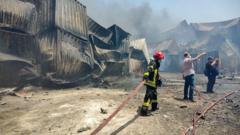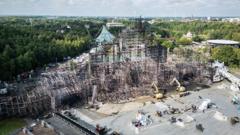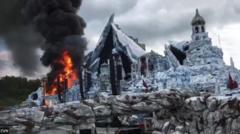Following a devastating explosion at Shahid Rajaee port, Iranian officials attribute the disaster to negligence and lack of safety compliance, which has resulted in at least 70 fatalities and over 1,000 injuries. Investigations are underway to hold accountable those responsible for the incident.
Iran's Port Explosion: Negligence Cited as Death Toll Rises

Iran's Port Explosion: Negligence Cited as Death Toll Rises
The Iranian government acknowledges negligence in the deadly port explosion at Bandar Abbas, heightening concerns over safety.
Iran's interior minister has highlighted negligence as a contributing factor in the tragic explosion and subsequent fire at Iran's largest container port, causing a rising death toll currently at 70. The event, which took place on Saturday at Shahid Rajaee port in Bandar Abbas, also left more than 1,000 individuals injured. Interior Minister Eskandar Momeni stated that the incident stemmed from "shortcomings, including noncompliance with safety precautions and negligence." He mentioned that several individuals deemed responsible for the incident had been summoned for questioning.
Details reveal that the fire ignited from imported cargo that exploded. The Iranian defense ministry has countered foreign claims that the fire originated from a shipment of chemicals related to missile fuel. On Monday, Mehrdad Hassanzadeh, the provincial crisis management director, indicated that the firefighting operations at the port were nearing completion. Meanwhile, Hormozgan Governor Mohammad Ashouri Taziani noted that cleanup efforts would take several more days and that restoring normal conditions at the port might take one to two weeks.
The Customs Administration reported that the cargo that exploded had neither been registered nor declared prior to the incident, according to the Isna news agency. The CEO of Sina Marine and Port Services Development Company, responsible for the area, attributed the explosion to "a repeated and catastrophic error involving false declarations of hazardous goods."
In response to reports insinuating that the explosion was linked to improperly handled sodium perchlorate—a solid fuel associated with ballistic missiles—the Iranian defense ministry firmly denied such claims, dismissing them as "fake news." However, Ambrey Intelligence, a maritime risk firm, indicated that the port accepted a sodium perchlorate shipment last month, and allegations of improper handling were raised following the disaster. Further, an unnamed individual connected to Iran's Revolutionary Guards informed The New York Times that the explosion indeed involved sodium perchlorate.
The tragic aftermath of this explosion has sparked public mourning that is quickly turning to anger as the search for accountability begins in Iran.























